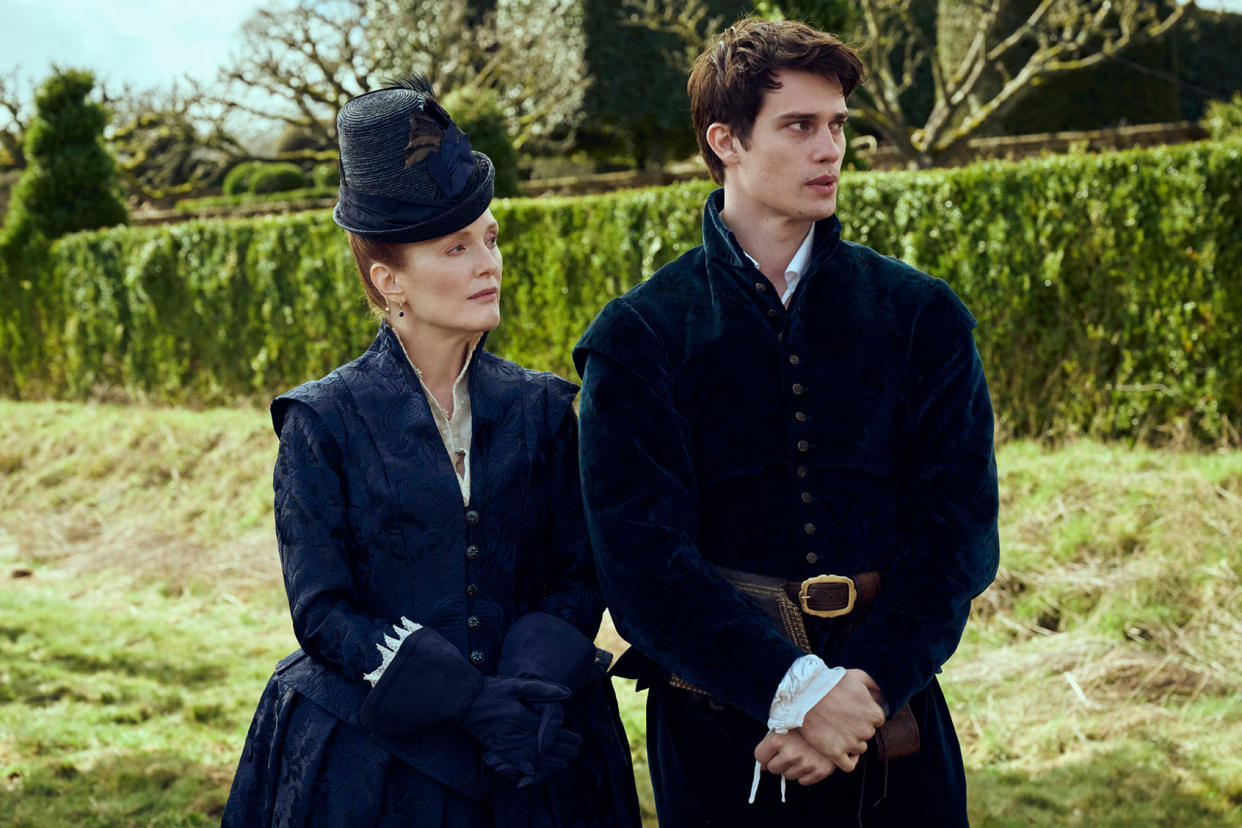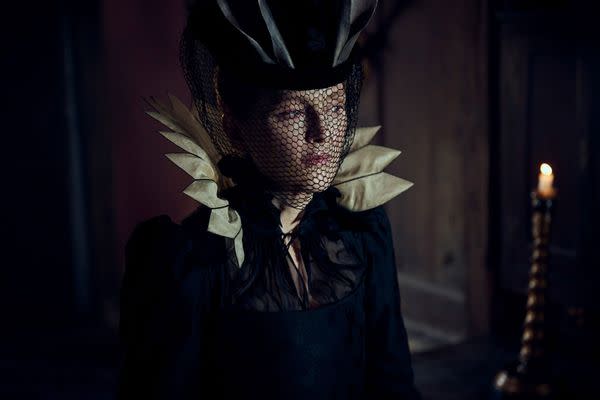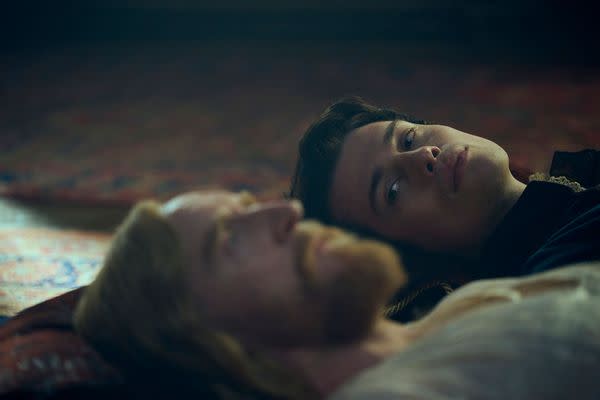"Mary & George" may be shallow, but it's also a lusty, wickedly fun gallop through history

Mary Villiers wasn’t born to power. She had to scheme her way there from the dirt, learning what she was up against on the way up. An early episode of “Mary & George” shows how vicious those lessons could be as Julianne Moore’s Mary first stares into the face of Lady Elizabeth Hatton (a scene-stealing Nicola Walker).
Mary hasn’t a clue who she’s tangling with, assuming manners and etiquette will get her by. Then the good “lady” opens her mouth to offer her thoughts on the late “virgin” queen with whom she shares a name.
“Why must she be touted as some magic hymen savior of all mankind?” Elizabeth says, adding she still would've achieved everything all the same “if she’d eased onto the old coil of flesh.”
“’Coil of flesh’?” Mary repeats with a lilt of admiring intimidation that fails to win over her guest.
“Whatever nomenclature you prefer,” Elizabeth offers, accentuating her speech with oozing hauteur. With that, the good lady drops her act to make it clear in so many words, some with four letters, that she only showed up to shred Mary and her family in person.

Mary is taken aback, but she's a quick study — and Moore uncurls her wordless look of insult into determination, comforting her children with a mother’s soothing assurances moments after the offending guest stalks off. Mary's true self shows up later as she quietly processes her next move with her partner in her lifelong con, her second son George (Nicholas Galitzine).
History well told is rarely dry, yet so many tales of court intrigue either conflate seriousness with the stiffness of starched collars or bloat the action with too many anachronisms. Like ice cubes melted in white wine, they water down the narrative and probably didn’t belong there in the first place. When they do, that means you’re probably watching “Bridgerton” or another show styled by history rather than mapping it.
“Mary & George” strikes a desirable balance, delivering a little of the unexpected and uncouth in welcome spots, especially where the randy bits are concerned. The dramatization of George and Mary Villiers’ rise in King James the VI and I’s court calls for it, along with its leads' flawlessly pitched portrayals. That’s expected from Julianne Moore and acclaimed Scottish actor Tony Curran.
But Galitzine’s ownership of George may be something of a surprise to those who know him mainly as the closeted prince in "Red, White & Royal Blue," the pretty prize in Amazon’s “Cinderella” or “Bottoms”’ vain football star. A relative newcomer, he establishes his brightness has a place in the same section of their sky.
Still, this is as much Mary’s story as George’s – more hers, truth be told. Although Galitzine pulls the light from his first scenes, the first few hours are a growth process as George speedily evolves from an insecure young man doing his mother’s bidding to a pleaser to a player at court.
This is also a love story, in case the ample nudity wasn't enough of a clue, although one less concerned with romance than status, along with the agency and impunity that comes with having a royal’s favor.

Mary is an unsympathetic woman whose bare ambition coaxes her to round her cragginess into more graceful shapes that still cut, as all to underestimate her come to comprehend.
She announces her intentions for George the moment he’s born by refusing to cut him free of her, and that bond holds throughout their lives except in the moments whenever politics hint distance is the better path.
Tradition dictates that George, her second born boy, inherits nothing. But George is blessed with angelic looks, and that changes her calculus. Mary funds a trip to France where George’s mentors train him to speak well, dance and be a top-shelf, sexually adaptable courtier. Soon he and Mary become a threat to the Earl of Somerset (Laurie Davidson), the king’s current favorite.
But if you’ve seen the poster, you already know George eventually makes headway with King James (Curran) in bed and mood, imposing his and his mother’s influence on society and England by extension.

Series creator DC Moore correctly assumes the audience shares James’ prioritization of entertainment over statecraft while toeing the line between severity and silliness, a measure of control imposed, if not demanded by the story’s bawdiness.
Previews of “Mary & George” push its spiciness, as any drama casting Galitzine as a libidinous figure would. Moore’s Mary gets to enjoy herself too instead of being limited to grimacing through political marriages to boring wealthy men, which is refreshing. She takes pleasure and comfort with a sex worker named Sandie (Niamh Algar) who recognizes Mary’s capabilities and hitches her fortunes to hers while eventually recoiling from her inhumanity.
Want a daily wrap-up of all the news and commentary Salon has to offer? Subscribe to our morning newsletter, Crash Course.
Yet their relationship, such as it is, is one of the most genuine and stable in “Mary & George.” It’s also an example of the plot’s relative shallowness and scripts more concerned with verbal blood sport than teasing out its characters’ interiority.
Moore fills in those blanks, as does Curran, whose James explodes with lust in one moment only to deflate into a lonely pathos at a second’s notice. His is the most agile and unrestrained performance in a cast tasked with binding their moods in etiquette. (This also makes a scene where Moore’s Mary blows her composure in polite company simultaneously agonizing and hysterical.)
The real selling point, aside from the sensuality, is Mary’s caustic quickness. By the time her final husband of convenience realizes his role is vestigial, he can’t muster enough ire to make her flinch. “This whole family belongs in Sodom,” he says angrily, to which Mary replies, unbothered, “I don’t fancy another move.”
Moore bathes the story’s sentiment in Mary’s worldview, an alluring combination of libertine and pragmatic with little desire to win friends, only influence – the type of woman Bravo’s Andy Cohen would kill to cast if she didn’t arrange for his end first. Don’t scoff — stripped of its velvet and luster this is that type of pleasure, only guilt-free, as the woman who inspired it would claim to be.
"Mary & George" premieres at 9 p.m. Friday, April 5 on Starz.
